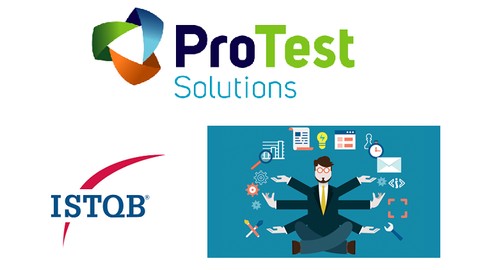
ISTQB® Certified Tester – Foundation Level – 2024
ISTQB® Certified Tester – Foundation Level – 2024, available at $94.99, has an average rating of 4.66, with 121 lectures, 6 quizzes, based on 5842 reviews, and has 25114 subscribers.
You will learn about You will get a basic understanding on software testing You will be able to discuss with other software testers using the same terminology You have paved the road for further learning and advancement in the ISTQB certification scheme With this course you will be able to pass the ISQTB – CTFL exam (V4.0 AND V3.1) You will have a high level overview on all parts included in software testing This course is ideal for individuals who are Junior testers and senior testers who want to start using common terminology or Anyone who wants or needs a basic understanding of software testing or Developers who want to understand software testing It is particularly useful for Junior testers and senior testers who want to start using common terminology or Anyone who wants or needs a basic understanding of software testing or Developers who want to understand software testing.
Enroll now: ISTQB® Certified Tester – Foundation Level – 2024
Summary
Title: ISTQB® Certified Tester – Foundation Level – 2024
Price: $94.99
Average Rating: 4.66
Number of Lectures: 121
Number of Quizzes: 6
Number of Published Lectures: 121
Number of Published Quizzes: 6
Number of Curriculum Items: 127
Number of Published Curriculum Objects: 127
Original Price: €19.99
Quality Status: approved
Status: Live
What You Will Learn
- You will get a basic understanding on software testing
- You will be able to discuss with other software testers using the same terminology
- You have paved the road for further learning and advancement in the ISTQB certification scheme
- With this course you will be able to pass the ISQTB – CTFL exam (V4.0 AND V3.1)
- You will have a high level overview on all parts included in software testing
Who Should Attend
- Junior testers and senior testers who want to start using common terminology
- Anyone who wants or needs a basic understanding of software testing
- Developers who want to understand software testing
Target Audiences
- Junior testers and senior testers who want to start using common terminology
- Anyone who wants or needs a basic understanding of software testing
- Developers who want to understand software testing
This is an ISTQB® accreditedcourse for the the CTFL (Certified Tester Foundation Level) certification for the latest syllabus!
This is not a read-out of the syllabus as is the case in many other courses as I do not see that as a proper course. The information from the syllabus is used in this course, mentioned, explained and wherever necessary examples are given in native-level English. Each chapter contains a quiz at the end which contains actual exam questions in order for you to get used to the way questions are asked on the exam. In each chapter we will also solve several questions together to get you used to the way questions are asked in the ISTQB® Exam. This is an important part as both the questions and answers are sometimes formulated to throw you off.
This course has been written to help (aspiring) software testers, developers and other people interested in software testing grasp the basics and fundamentals of software testing. This course is both accredited for V4.0 AND V3.1. The entire syllabus is covered and some extra bonus material is also included. All terminology matches the terminology used in the online ISTQB® glossary.
Besides getting you ready for the ISTQB®-CTFL exam with the course, sample exams and tips and tricks, I would really like to teach you about software testing; things that you can use in your day-to-day work.
As you can see on Udemy, there are various courses already on this subject; so why would you take thiscourse?
1. The course has been written on the latest version (2023 – V4.0) AND and some interesting and valuable subjects from the 2011 and 2018 versions are also included;
2. The material is ISTQB® accredited and is the same material as if you would come in and join one of my classroom trainings;
3. There are more than 130 questions included in the course that will help you greatly; sample questions are also constantly added;
4. We will go through questions together in each chapter;
5. Examples and exercises form a vital aspect of this course;
6. No false promises about you being a great software tester after you finish this course; however, this course is a very good starting point;
7. You will learn the basics and should be able to pass the exam without problems in the first go (if you pay attention of course);
8. Besides getting ready for the exam and most likely passing it on your first attempt, you will get a solid understanding of software testing fundamentals.
If you have any questions or remarks during the course, please post it on the discussion board and I will answer as fast as possible.
Course Curriculum
Chapter 1: Introduction
Lecture 1: Introduction
Chapter 2: Fundamentals of Testing
Lecture 1: What is Testing?
Lecture 2: Why is Testing Necessary
Lecture 3: Testing and Quality Assurance
Lecture 4: Errors, Defects, Failures, and Root Causes
Lecture 5: The Seven Testing Principles
Lecture 6: Test Activities, Testware and Test Roles – Introduction
Lecture 7: Test Activities & Testware – Test Planning
Lecture 8: Test Activities & Testware – Test Monitoring & Control
Lecture 9: Test Activities & Testware – Test Analysis
Lecture 10: Test Activities & Testware – Test Design
Lecture 11: Test Activities & Testware – Test Implementation
Lecture 12: Test Activities & Testware – Test Execution
Lecture 13: Test Activities & Testware – Test Completion – V4.0
Lecture 14: Traceability between the Test Basis and Testware
Lecture 15: Roles in Testing
Lecture 16: Essential Skills and Good Practices in Testing – Introduction
Lecture 17: Generic Skills Required for Testing
Lecture 18: The Whole-Team Approach
Lecture 19: Independence of Testing
Lecture 20: Summary – Keywords Explained – Fundamentals of Testing
Lecture 21: Sample Questions and Explanation
Chapter 3: Testing Throughout the Software Development Lifecycle
Lecture 1: Testing Throughout the Software Development Lifecycle – Introduction
Lecture 2: Testing in the Context of a Software Development Lifecycle – Introduction
Lecture 3: Impact of the Software Development Lifecycle on Testing
Lecture 4: Verification vs Validation
Lecture 5: Sequential Models
Lecture 6: Incremental and Iterative Models
Lecture 7: Agile Software Development
Lecture 8: Good Testing Practices
Lecture 9: Test First Approaches
Lecture 10: DevOps and Testing
Lecture 11: Shift-Left Approach
Lecture 12: Continuous Integration
Lecture 13: Retrospectives and Process Improvements
Lecture 14: Test Levels – Introduction
Lecture 15: Test Levels – Component Testing
Lecture 16: Test Levels – Component Integration Testing
Lecture 17: Test Levels – System Testing
Lecture 18: Test Levels – System Integration Testing
Lecture 19: Test Levels – Acceptance Testing
Lecture 20: Test Types
Lecture 21: Confirmation Testing and Regression Testing
Lecture 22: Maintenance Testing
Lecture 23: Summary – Keywords Explained – Testing throughout the SDLC
Lecture 24: Sample Questions and Explanation
Chapter 4: Static Testing
Lecture 1: Static testing – Introduction
Lecture 2: The Basics of Static Testing
Lecture 3: Work products Examinable by Static testing
Lecture 4: The Value of Static Testing
Lecture 5: Differences between Static and Dynamic Testing
Lecture 6: Benefits of Early and Frequent Stakeholder Feedback
Lecture 7: Review Process Activities
Lecture 8: Applying Review Techniques
Lecture 9: Roles and Responsibilities in Reviews
Lecture 10: Review Types
Lecture 11: Success Factors for Reviews
Lecture 12: Summary – Keywords Explained – Static Testing
Lecture 13: Sample Questions and Explanation
Chapter 5: Test Analysis and Design
Lecture 1: Test Analysis and Design – Introduction
Lecture 2: Test Techniques Overview
Lecture 3: Black-Box Test Techniques – Introduction
Lecture 4: Black-Box Test Techniques – Equivalence Partitioning
Lecture 5: Black-Box Test Techniques – Boundary Value Analysis
Lecture 6: Black-Box Test Techniques – 2-Value Boundary Value Analysis
Lecture 7: Black-Box Test Techniques – 3-Value Boundary Value Analysis
Lecture 8: Black-Box Test Techniques – EP & BVA Combined
Lecture 9: Black-Box Test Techniques – Decision Table Testing
Lecture 10: Black-Box Test Techniques – State Transition Testing
Lecture 11: Black-Box Test Techniques – Use Case Testing
Lecture 12: White-Box Test Techniques – Introduction
Lecture 13: White-Box Test Techniques – Statement Testing and Statement Coverage
Lecture 14: White-Box Test Techniques – Decision Testing and Decision Coverage
Lecture 15: White-Box Test Techniques – Branch Testing and Branch Coverage
Lecture 16: The Value of White-Box Testing
Lecture 17: Experience-Based Test Techniques – Introduction
Lecture 18: Experience-Based Test Techniques – Error Guessing
Lecture 19: Experience-Based Test Techniques – Exploratory Testing
Lecture 20: Experience-Based Test Techniques – Checklist-Based Testing
Lecture 21: Collaboration-Based Test Approaches – Introduction
Lecture 22: Collaborative User Story Writing
Lecture 23: Writing Acceptance Criteria
Lecture 24: Deriving Test Cases using Acceptance Test-Driven Development (ATDD)
Lecture 25: Choosing Test Techniques
Lecture 26: Summary – Keywords Explained – Test Analysis and Design
Lecture 27: Sample Questions and Explanation
Chapter 6: Managing the Test Activities
Lecture 1: Managing the Test Activities – Introduction
Lecture 2: The Purpose & Content of a Test Plan
Lecture 3: Tester's Contribution to Iteration and Release Planning
Lecture 4: Entry & Exit Criteria
Instructors
-
Wouter Vrijen
Software Tester, Testing Lead, Test Manager, Trainer
Rating Distribution
- 1 stars: 30 votes
- 2 stars: 46 votes
- 3 stars: 404 votes
- 4 stars: 1895 votes
- 5 stars: 3467 votes
Frequently Asked Questions
How long do I have access to the course materials?
You can view and review the lecture materials indefinitely, like an on-demand channel.
Can I take my courses with me wherever I go?
Definitely! If you have an internet connection, courses on Udemy are available on any device at any time. If you don’t have an internet connection, some instructors also let their students download course lectures. That’s up to the instructor though, so make sure you get on their good side!
You may also like
- Top 10 Content Creation Courses to Learn in December 2024
- Top 10 Game Development Courses to Learn in December 2024
- Top 10 Software Testing Courses to Learn in December 2024
- Top 10 Big Data Courses to Learn in December 2024
- Top 10 Internet Of Things Courses to Learn in December 2024
- Top 10 Quantum Computing Courses to Learn in December 2024
- Top 10 Cloud Computing Courses to Learn in December 2024
- Top 10 3d Modeling Courses to Learn in December 2024
- Top 10 Mobile App Development Courses to Learn in December 2024
- Top 10 Graphic Design Courses to Learn in December 2024
- Top 10 Videography Courses to Learn in December 2024
- Top 10 Photography Courses to Learn in December 2024
- Top 10 Language Learning Courses to Learn in December 2024
- Top 10 Product Management Courses to Learn in December 2024
- Top 10 Investing Courses to Learn in December 2024
- Top 10 Personal Finance Courses to Learn in December 2024
- Top 10 Health And Wellness Courses to Learn in December 2024
- Top 10 Chatgpt And Ai Tools Courses to Learn in December 2024
- Top 10 Virtual Reality Courses to Learn in December 2024
- Top 10 Augmented Reality Courses to Learn in December 2024






















